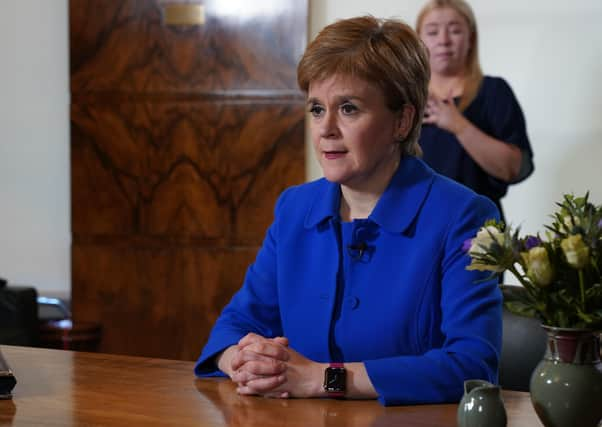To make students criminals for going home is affront to basic human liberties - John McLellan


Cue well-known people flooding social media with sympathetic reminiscences about how hard they would have found university life under these conditions and First Minister Nicola Sturgeon saying the same. Behind this is the same message we’ve heard for six months; we live in extraordinary times, the virus hasn’t gone away, it’s a killer, lives have got to be saved and ‘our NHS’ still needs to be protected. The clear inference is that young people still gathering to drink, hug, kiss and do all the other things people stepping out into the world get up to were behaving irresponsibly, as if it’s a surprise that thousands of freshers didn’t obediently troop into their cells like monks in a monastery.
Grim-faced political and medical figureheads like the First Minister dishing out the edicts are always very keen to tell us how sorry they are, how they really don’t want to do it and there really is no alternative. And the 99.9 per cent of us who aren’t epidemiologists shrug our shoulders and with a sorrowful head-shake go along with it. Universities, mindful of where their cash comes from, slavishly back it up with threats of expulsions, despite losing more revenue as tenancy agreements are shredded.
Advertisement
Hide AdAdvertisement
Hide AdI might only be a part-timer, but all university teachers will testify to the number of students who experience mental health issues and report serious anxiety problems, and for whom the family home provides a place of respite and reassurance. Not all are lucky enough to have such a place of sanctuary, but the majority do.
Those of us who went away to university will also remember that while we might have felt all grown up having a place of our own for the first time, as much as we’d try to kid ourselves otherwise, a room in a hall of residence with a big shared kitchen wasn’t really home at all. That was where tea was miraculously on the table, where the fridge always had milk, and where no-one banged on your door at 1am asking for Rizzlas, or worse.
Going away for the first time is certainly fun, but it can be lonely too and home is not just where the heart is but an essential part of student well-being, knowing it’s there if things go wrong, where problems can be shared with people you trust. Now students are being singled out as a danger to their loved ones and should stay away, lest they inadvertently spread the virus. Sure, medical exemptions can be made, but there is no escaping the fact that thousands of people are being told it is an offence to spend time in the place they grew up, even if they are virus-free.
We can only presume this is to stop the NHS being overwhelmed, the same NHS which was noticeably not overwhelmed by the first wave in Spring, when the vast Nightingale hospitals lay empty while thousands of elderly people were cleared out of geriatric units and packed off to care homes where Covid-19 was thriving amongst the vulnerable. It seemed that the NHS, not lives, was the priority.
Well students are vulnerable too and there comes a point where the treatment outweighs the benefit and such is the panic about a second wave that the mental health and emotional well-being of the young are being sacrificed because of fears for the physical health of the elderly, and, of course, for the NHS. We have gone along with the advice about not visiting relatives, wearing masks and walking in big circles around each other in wide open spaces. We are even prepared to go along with clearly illogical instructions that it’s dangerous for a handful of people to go to a house but not to sit amongst scores in the local ‘Spoons. We understood the message about staying at home, but to become a criminal for going home is a breath-taking affront to basic human liberties. The bond of trust is being broken.
To put it in context, the excess Scottish death rate in the winter of 2017-18 increased by 4,797, mainly victims of the flu or pneumonia and 500 more than have been killed by Covid-19 in Scotland so far. It led to an awareness campaign to encourage vulnerable people to get vaccinated, not the separation of families until they did, and there were still just over 2,000 excess seasonal deaths the following year. That was deemed a success because viruses are accepted as part of the world in which we live and Covid-19 is just the latest, albeit more deadly, mutation.
So much more is known about treating the disease than seven months ago – hospital survival rates are up from 66 per cent to 84, according to international respiratory research -- and whatever it takes the NHS should be prepared to cope, no matter what a second wave produces. When young people were still able to complete university courses at the height of the first wave, politicians should not be inflicting more harm in this phase than then.
Readers of this column will know that my father was one of the victims, so I need no lessons in the danger the virus presents, but I also have experience of recognising when treatment brings no benefit. There should certainly be no suggestion that families will be forcibly split at Christmas, a time for hope after what has been the most dreadful year in living memory. When Chancellor Rishi Sunak said on Thursday that “our lives can no longer be put on hold” that should apply to students too.
Good policing, as the police themselves constantly remind us, is by consent and on home bans we should collectively say our consent is withdrawn.
Comments
Want to join the conversation? Please or to comment on this article.